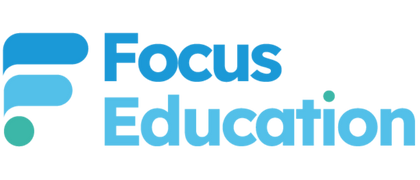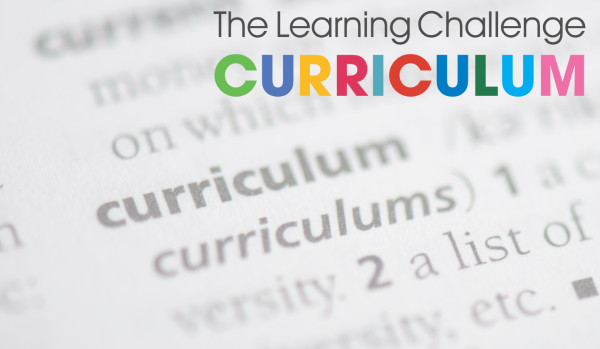
Developing progression across the Primary curriculum is an absolutely crucial aspect of developing learners who continue to be successful throughout their education. As teachers, what we do matters so much more than just for the day, week or term that we teach something, but in the wider sense of what the children do over the next few years and beyond. Everything children do in Primary school is formative and will set them up to hopefully succeed in all that they want to achieve as they move forward through their education. What we do in Primary schools is so unbelievably important and I cannot stress this highly enough.
The Technical Stuff
So, progression is what I’m here to write about, and it is for the very reasons stated above. The children need to build on everything they do in order to know more and remember more. If we don’t put the building blocks in the right place and in the right order then the children we teach may fail to reach their full and amazing potential.
Metacognition is a word that gets mentioned a lot. It’s definition: to understand and be aware of how we learn. This is important as educators, as we need to be aware of how the 30 plus children in our care learn and build on learning in order to be successful day-to-day, week-to-week, term-to-term and year-to-year. When I first looked at metacognition, I remember travelling down a rabbit hole involving ‘schemata’ or ‘schema’, and I found these images (taken from https://www.blakeporterneuro.com/inside-outs-take-on-the-brain-a-neuroscientists-perspective/ ) to help place things clearly:
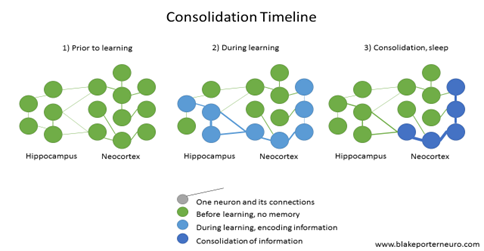
The main thing that is important for teachers to understand, is that there is a short term and a long term memory. It is only by making links between what has been learned before that children have a better chance of retaining new information – by making links with prior knowledge.
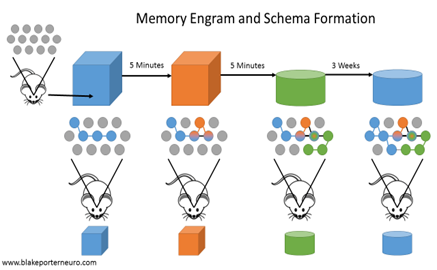
In this image, a mouse experiences different shapes. He sees a blue cube. Five minutes later it is shown an orange cube. It knows that it’s a cube because it has seen one before, so the prior learning is the shape, the new learning is the colour. Five minutes later again, it is shown a green cylinder. It knows that it is a shape, due to prior learning, but the name of the shape and the colour are new. Three weeks later, the mouse is shown a blue cylinder – this reaffirms learning about the colour blue as it has seen a blue cube before and the shape of a cylinder as it has seen a green one before. This is a simple example, and the blog I cited previously goes into much more detail and is worth a read if you want to find out more. In essence, learning knowledge and remembering knowledge is easier when we can link it to something that we have learned before.
Avoiding Overload
So I said I was going to talk about progression. This is a key part of it. Progression is all about providing the building blocks to enable children to keep building knowledge in their long term memory. Metacognition and schema are so important. This is why the Learning Challenge Curriculum developed by Focus Education works so well. Each unit is carefully crafted so that the children learn key knowledge one step at a time. The knowledge is broken down into smaller chunks and built upon systematically so that cognitive overload (trying to take in too much information at the same time) can be avoided. For this reason, I want to take you through how one aspect of the learning challenge curriculum builds on children’s prior learning through careful sequencing in order to support teachers to enable children to know more and remember more.
How the Learning Challenge Curriculum works
I’m going to take you through the subject of History. Partly because it’s an area of the curriculum which is close to my heart, but that we can take so much away from it and apply it to other areas too. So, units of learning begin with an overarching ‘enquiry question’. One which gets the children thinking about what they are about to learn. The units are built around the key substantive knowledge they need to remember and the disciplinary knowledge/skills they can utilise in future learning as seen in our example below:
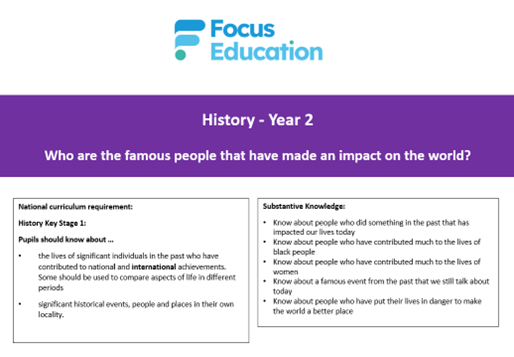
By using an enquiry approach we are ensuring that there is progression throughout each unit with a focus on prior learning. Each unit begins with an over-arching question (composite) which is split up into further sub-enquiries (components). The sequencing here is important, as you cant teach the second component without first teaching the opening component of the unit. The reason the LCC works so well, is because it really does build upon each previous block within a unit. There is also a methodology of ‘Link it. Learn it. Check it. Show it. Know it’ which means that the children are continuously making links, revisiting key aspects, and showing what and how they have remembered it.
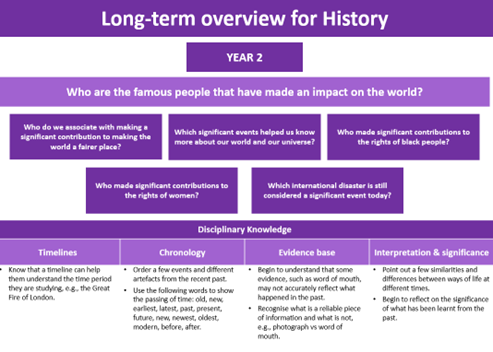
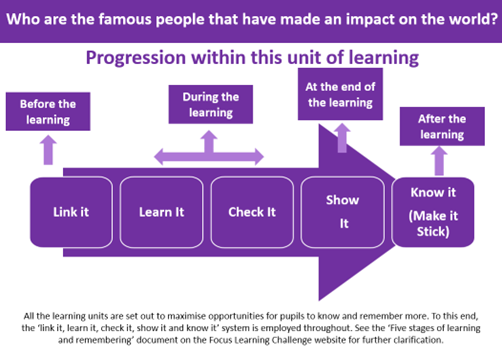
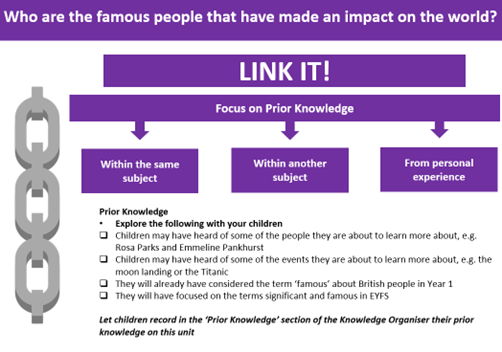
The LCC also includes knowledge organisers for each unit, which make the key substantive knowledge really clear to both students and staff. It also highlights the key vocabulary which will form part of the student’s learning. This is so important when reviewing learning and giving children the opportunity to refer back when consolidating their own knowledge.
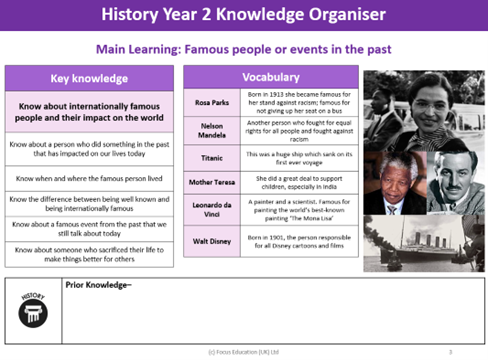
The great thing is that this doesn’t only apply to units in a standalone fashion. Every unit has been built in this way and they all fit into the overarching progression. This means that it is really easy to see how each unit fits in with other units across the year, the units that have been taught in previous years and the units that the children will be taught in future years. This is also broken down into different disciplinary strands. Chronology and Causation, for example, can be seen here: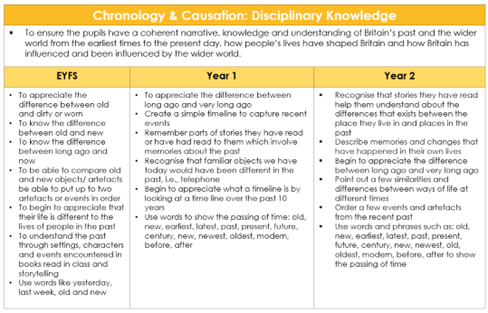
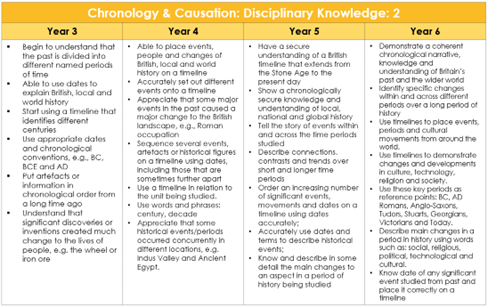
Substantive knowledge is also broken down in a similar way. As a subject leader, this makes it really straight forward to have an overview of History across the school.
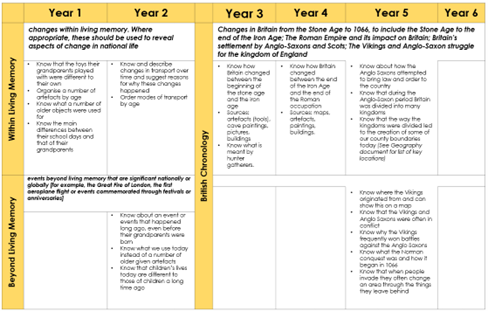
Vocabulary is also extremely important. The new overview that I have written for History vocabulary shows how both key and additional language can be developed in history lessons across the whole Primary phase, and it is linked directly to the LCC. Here is an example of the ‘topic specific’ vocabulary for year 4:
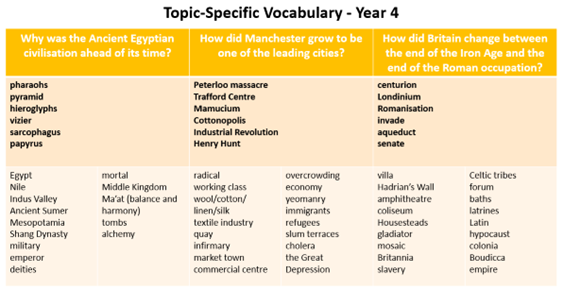
Disciplinary vocabulary is also made explicit, and it is broken down into the key areas of ‘chronological understanding’, ‘knowledge of people, places and events’, ‘conceptual knowledge’ and ‘enquiry’ here:
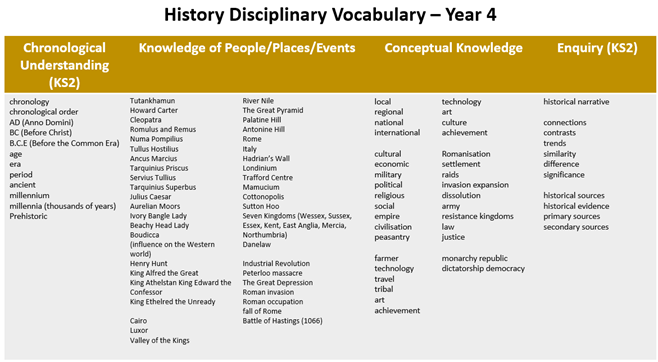
Furthermore, each unit is fully planned and resourced (including retrieval activities and an end of unit summative assessment) in order to support teachers with developing learners who can achieve the best possible outcomes. Each unit builds on the previous one. Each unit builds on the previous year’s learned knowledge. Each unit sets the children up for their next unit of learning. The resources and retrieval activities also mean that it is really easy to deliver and assess what the children have or haven’t learned so that teachers can provide further opportunities and intervention to enable all learners to be successful.
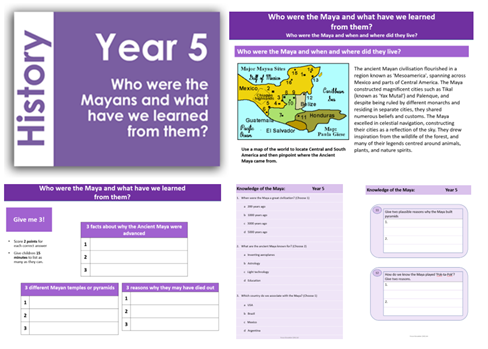
So there you have it, the Learning Challenge Curriculum really is setup for helping children to know more and remember more, providing the building blocks manageably, steadily and progressively, building children’s schema (links) through strategies for metacognition (children understanding how they themselves learn) in order to avoid cognitive overload and to be able to apply their new knowledge in future learning. If you can get the sequencing and progression right, you can produce life-long learners who will reach their potential.
Find out more about the Learning Challenge Curriculum
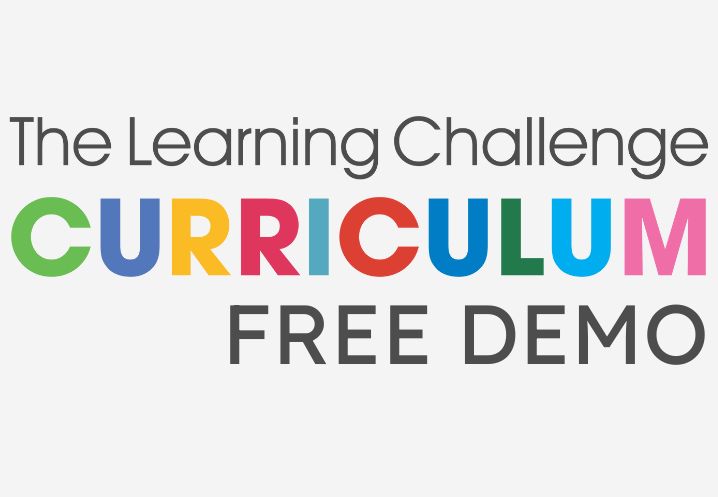
Alex Neophitou will introduce you to the concept of the Learning Challenge Curriculum. He will show how each unit is carefully crafted to that children learn key knowledge one step at a time.
He will take you through how one aspect of the learning challenge curriculum builds on children’s prior learning through careful sequencing in order to support teachers to enable children to know more and remember more.
Alex will go through the resources including the units of learning, the assessments and the knowledge mats as well as the recently added vocabulary overviews and he will also introduce you to the Art and DT curriculums.
There is a chance to ask questions and get more information about our curriculum. There is absolutely no obligation to buy.
We are passionate about our curriculum and want to show it to as many people as possible. If you are looking for a change or want to implement a new curriculum that will have an impact and be cost effective, then this session is for you.

